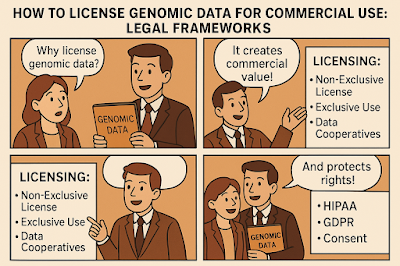How to License Genomic Data for Commercial Use: Legal Frameworks
How to License Genomic Data for Commercial Use: Legal Frameworks
Genomic data holds immense value for pharmaceutical R&D, AI-driven diagnostics, and precision medicine startups.
However, licensing this data for commercial use involves navigating a maze of legal, regulatory, and ethical constraints.
This post breaks down the legal frameworks that govern genomic data licensing—from consent models to IP protection to cross-border transfer laws.
📌 Table of Contents
- Why Genomic Data Has Commercial Value
- Types of Genomic Data Licensing Pathways
- Legal and Ethical Frameworks to Navigate
- Cross-Border Data Use and Privacy Compliance
- Explore More: Related Insights
Why Genomic Data Has Commercial Value
Genomic datasets power biomarker discovery, drug target validation, polygenic risk scores, and algorithmic diagnosis models.
Biotech firms, diagnostics labs, and AI health startups use this data to train machine learning models or identify new markets for therapeutics.
Proper licensing ensures lawful monetization while protecting donor privacy and consent.
Types of Genomic Data Licensing Pathways
- Non-Exclusive Commercial Licenses: Allow multiple companies to use de-identified data for R&D or clinical AI training.
- Exclusive Use Rights: Typically reserved for pharmaceutical firms funding the data collection effort.
- Data Co-Ventures: Strategic partnerships where data custodians and commercial users share IP revenue or downstream equity.
- Data Cooperatives: Owned by donors; grant conditional licenses under transparent governance agreements.
Legal and Ethical Frameworks to Navigate
- HIPAA (U.S.): Protects identifiable health data; genomic sequences may qualify as PHI depending on context.
- GDPR (EU): Treats genetic data as sensitive personal data requiring explicit consent and minimization practices.
- Common Rule (U.S.): Applies to federally funded research involving human subjects.
- OECD Guidelines: Promote international harmonization of consent, transparency, and security in biomedical research.
Obtaining broad, tiered, or dynamic consent is essential when negotiating data use rights.
Cross-Border Data Use and Privacy Compliance
Licensing genomic data internationally requires understanding:
- Standard Contractual Clauses (SCCs) and Data Protection Agreements (DPAs) between parties
- Jurisdictional restrictions (e.g., China's data export controls, Canada’s PIPEDA)
- Genetic sovereignty laws in countries like India, Brazil, and South Africa
Platforms such as GA4GH and ELIXIR offer federated data access models to minimize direct transfers.
Explore More: Related Insights
Learn more about ethical licensing, biotech law, and federated data frameworks below:
Important keywords: genomic data licensing, HIPAA, GDPR, biotech IP, cross-border data law
